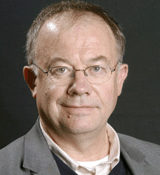 |
| Gilles Kepel |
It's a fight that erupted late last year after the Paris terrorist attacks and that has grown increasingly heated, with two longtime scholar-experts and onetime friends resorting to names like "ignoramus." I've started to write about this particularly Gallic intellectual feud between Olivier Roy and Gilles Kepel more than once but my surgery delayed the post so I'll use the NYT article as an excuse..
While the US Presidential campaign spouts a lot of ill-informed rhetoric about the dangers of radical Islam, real or imagined, France, which has had much first-hand experience, is also witnessing a debate over the nature of Islamic radicalism. The difference is that the main proponents on each side actually know what they are talking about. In fact, they have long dominated the conversation.
 |
| Olivier Roy |
For those who don't read French, the NYT piece provides a short introduction, as does this Washington Post column.
Subscribers to The Chronicle of Higher Education will find a good summary behind a paywall here.
If you read French, however, you might as well go to the source. Last November, in the wake of the Paris terror attacks, Roy published an article in Le Monde called "Olivier Roy: « Le djihadisme est une révolte générationnelle et nihiliste »."
His argument, oversimplified of course from its Gallic precision, is that the radicalized Muslims of the Paris suburbs are not really motivated by religion but by nihilism and anarchism, and that Islam is a rationalizing overlay, or, in Roy's aphoristic summary, "the Islamization of radicalism."
By December, Gilles Kepel was taking exception in articles such as this interview in the conservative Le Figaro: "Gilles Kepel: «L'objectif de l'État islamique ? Déclencher une guerre civile en France»." An English summary of the objections to Roy can be found in this piece by Francois Burgat. Kepel and his supporters take a more traditional approach, seeing European Islamists more traditionally, as radicalized Islamists.
After the Brussels attacks, Kepel emphasized his views:'"Molenbeek français': la mise au point de Gilles Kepel." Roy reiterated his views in other articles, and in March Kepel struck back with a provocatively titled article in Libération: "«Radicalisations» et «islamophobie»: le roi est nu."
"Le roi est nu," or "The king is naked," is an obvious pun (roi/Roy) on Olivier Roy's name.
And that only brings the back-and-forth up to March. The rhetoric has gotten increasingly personal.
Now, while I am generally familiar with the literature on Jihadism, I am no expert, and certainly not in a league with Gilles Kepel and Olivier Roy, nor have I studied radical Islam in Europe, as both men have. As a historian rather than a political scientist, I tend to be skeptical of theory and rigid structural analysis, and I tend to be pragmatic. From that perspective, the difference between "the Islamization of radicalism" and "the radicalization of Islam" seems to be the question of which you address first. But it also seems that both Islam and a nihilistic desperation play a role. Do we really need a Manichean dichotomy, a zero-sum construct where either one formula or the other is sacrosanct? or could we learn more from reading both Kepel and Roy?
But what do I know? I'm not even French.
After the Brussels attacks, Kepel emphasized his views:'"Molenbeek français': la mise au point de Gilles Kepel." Roy reiterated his views in other articles, and in March Kepel struck back with a provocatively titled article in Libération: "«Radicalisations» et «islamophobie»: le roi est nu."
"Le roi est nu," or "The king is naked," is an obvious pun (roi/Roy) on Olivier Roy's name.
And that only brings the back-and-forth up to March. The rhetoric has gotten increasingly personal.
Now, while I am generally familiar with the literature on Jihadism, I am no expert, and certainly not in a league with Gilles Kepel and Olivier Roy, nor have I studied radical Islam in Europe, as both men have. As a historian rather than a political scientist, I tend to be skeptical of theory and rigid structural analysis, and I tend to be pragmatic. From that perspective, the difference between "the Islamization of radicalism" and "the radicalization of Islam" seems to be the question of which you address first. But it also seems that both Islam and a nihilistic desperation play a role. Do we really need a Manichean dichotomy, a zero-sum construct where either one formula or the other is sacrosanct? or could we learn more from reading both Kepel and Roy?
But what do I know? I'm not even French.

Thanks for this and your other posts.
ReplyDeleteYour blog continues to be a rich source of information on a wide range of topics --language, history, politics to name just a few.
The breadth of issues you cover and the analysis you bring to bear are truly remarkable.